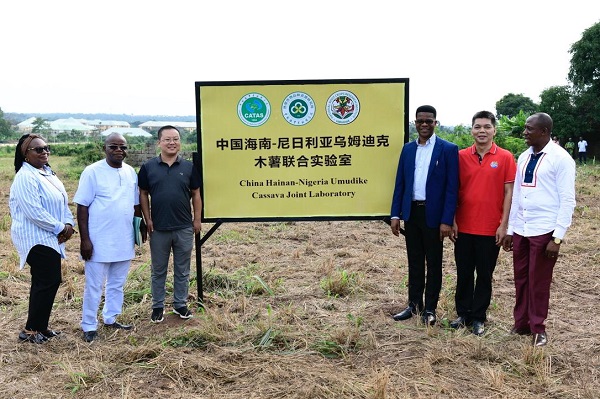
Leveraging technological advancements and fostering collaborative research between China and Nigeria will significantly enhance agricultural productivity and sustainability in Nigeria.
This assertion was made by the executive director/chief executive officer of the National Root Crops Research Institute (NRCRI) Umudike, Prof. Chiedozie Egesi during a three-day strategic meeting held at NRCRI from July 1 to 3, 2024.
In his welcome remarks, Egesi expressed his excitement about hosting visiting scientists, Professor Ou Wen and Dr. Gao Fei. He emphasised that an existing memorandum of understanding (MOU) between both research institutes since 2008 would be revitalised, aiming to establish a Nigeria-China Cassava Demonstration Base. This initiative is set to improve the cassava value chain in Nigeria under a South-South Cooperation between Nigeria and China.
According to Egesi, this collaboration, supported by the Food and Agriculture Organisation (FAO) of the United Nations (UNO), presents numerous opportunities for Nigeria.
“This meeting is crucial as leveraging this partnership will bolster technological advancements for Nigerians. It will help jump-start our agricultural production, making it comparable to nations that have attained food security. We have lessons to learn from this collaboration regarding agricultural mechanization: moving away from manual production of cassava, opening markets for Nigerian farmers for export and facilitating exchange visits between our scientists and their Chinese counterparts.”
Egesi emphasised that mechanising cassava production is a key focus, as it would reduce the physical strain on farmers and allow for a more seamless production process. He reiterated that Nigeria stands to learn much from China’s experience, noting that China, despite its large population, is now a net exporter of food. This stands in contrast to 40 years ago when China was food insecure.
Representatives from the Tropical Crops Genetic Resources Institute of the China Academy of Tropical Agricultural Sciences (TCGRI-CATAS) provided an overview of cassava genetic resources and their utilization for breeding in CATAS. Professor Ou Wen stated that the partnership would help transition the cassava value chain from manual to mechanised agriculture.
According to the Chinese representatives, China has successfully integrated and innovated cassava technologies, which they have shared with cassava-producing countries in Africa and Asia, enhancing the competitiveness of the local cassava industry.
“Since 1982, CATAS has established a strong working relationship with the International Center for Tropical Agriculture and achieved fruitful results in cassava resource sharing, technology transfer and personnel training,” said Wen.
Their recommendations included transforming cassava production from subsistence to commercial levels, building a whole value chain of production, processing and marketing, and improving farming regulations and product standards. They also emphasised the importance of increasing technical support from international organisations such as the International Centre for Tropical Agriculture (CIAT), the International Institute of Tropical Agriculture (IITA), FAO, the International Fund for Agricultural Development (IFAD), the United Nations Development Programme (UNDP) and the World Bank.
Other recommendations included enhancing infrastructure, improving cassava breeding and healthy seedling propagation, upgrading current planting and processing technology, establishing a science and technology innovation system and setting up a technical extension and service system.
The meeting featured various presentations by top NRCRI scientists and researchers, and included field inspections of sites for the China Hainan-Nigeria Umudike Cassava Joint Laboratory and the African Cassava Yield Doubling Programme Umudike Demonstration Base in Nigeria. Egesi expressed optimism that, based on the positive impacts observed in other African countries where Chinese technologies were implemented, Nigeria could achieve better yields, higher returns for farmers and a transition from manual to mechanised cassava production. He concluded that Nigeria could be on the cutting edge of the tools


